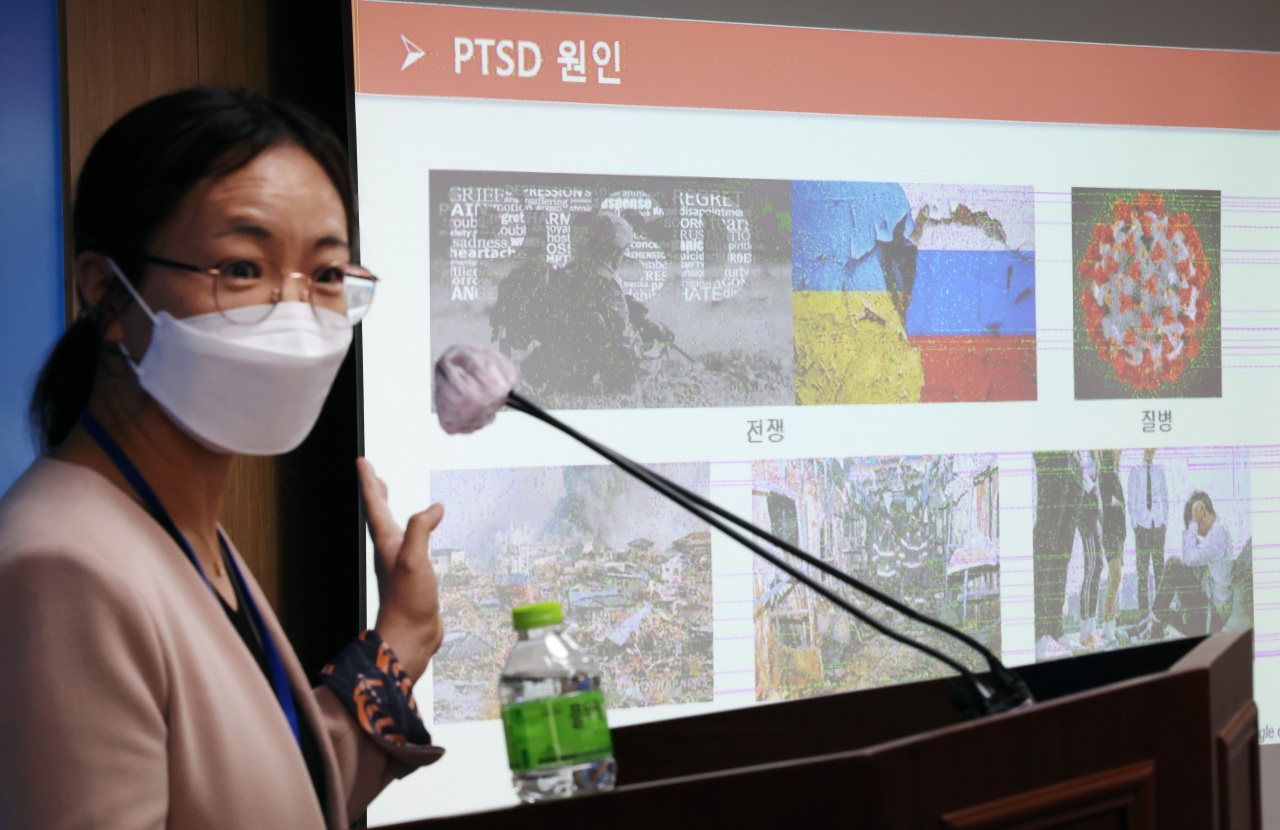PTSD treatment mechanism unlocked for 1st time
Findings to accelerate the development of post-traumatic stress disorder drugs: researcher
By Kan Hyeong-wooPublished : April 14, 2022 - 15:49

The Institute of Basic Science has identified the scientific mechanism of post-traumatic stress disorder treatment for the first time in the world through animal experiments, the Ministry of Science and ICT said Thursday.
According to the ministry, the researchers used the PTSD treatment NYX-783, which is currently under clinical trials by the US biopharmaceutical company Aptinyx, for animal experiments using mice and discovered the principle of its treatment effects.
In doing so, the researchers laid out the world’s first theoretical foundation and clear strategies for the development of PTSD treatment, the ministry said.
For the study, the researchers examined the ability of NYX-783 to reduce subsequent fear-based behaviors in male mice 24 hours after a fearful situation. The results showed that the recurrence of fear memory was suppressed in both auditory-fear conditioning and single-prolonged stress models.
The researchers analyzed that the administration can activate N-methyl-D-aspartate receptors or NMDA and induce the manifestation of brain-derived neurotrophic factor, or abrineurin, to improve the plasticity of nerve cells to restrain fearful memories.
“PTSD can occur due to various causes such as war, COVID-19, sexual violence and school violence. The number of (PTSD) patients has been steadily increasing since 2015 and the incidence rate is high,” said Lee Bo-young, the study’s lead author.
“We have identified the molecular mechanism of PTSD treatments for the first time. The results of this study are expected to accelerate the development of PTSD treatments targeting NMDA proteins,” she said.
The ministry explained that PTSD -- a mental disorder that occurs after experiencing or witnessing terrifying or life-threatening events -- is usually treated with psychiatric treatment such as cognitive behavioral treatment and depression medication at the same time, but the improvement rate is only about 50 percent.
“In the future, we intend to contribute to the treatment of various mental illnesses by applying multiple approaches to establish candidate materials for different mechanisms,” said Lee.
The study has been published in Molecular Psychiatry, a peer-reviewed scientific journal from Nature Publishing Group.
According to the ministry, the researchers used the PTSD treatment NYX-783, which is currently under clinical trials by the US biopharmaceutical company Aptinyx, for animal experiments using mice and discovered the principle of its treatment effects.
In doing so, the researchers laid out the world’s first theoretical foundation and clear strategies for the development of PTSD treatment, the ministry said.
For the study, the researchers examined the ability of NYX-783 to reduce subsequent fear-based behaviors in male mice 24 hours after a fearful situation. The results showed that the recurrence of fear memory was suppressed in both auditory-fear conditioning and single-prolonged stress models.
The researchers analyzed that the administration can activate N-methyl-D-aspartate receptors or NMDA and induce the manifestation of brain-derived neurotrophic factor, or abrineurin, to improve the plasticity of nerve cells to restrain fearful memories.
“PTSD can occur due to various causes such as war, COVID-19, sexual violence and school violence. The number of (PTSD) patients has been steadily increasing since 2015 and the incidence rate is high,” said Lee Bo-young, the study’s lead author.
“We have identified the molecular mechanism of PTSD treatments for the first time. The results of this study are expected to accelerate the development of PTSD treatments targeting NMDA proteins,” she said.
The ministry explained that PTSD -- a mental disorder that occurs after experiencing or witnessing terrifying or life-threatening events -- is usually treated with psychiatric treatment such as cognitive behavioral treatment and depression medication at the same time, but the improvement rate is only about 50 percent.
“In the future, we intend to contribute to the treatment of various mental illnesses by applying multiple approaches to establish candidate materials for different mechanisms,” said Lee.
The study has been published in Molecular Psychiatry, a peer-reviewed scientific journal from Nature Publishing Group.
-
Articles by Kan Hyeong-woo



















![[Today’s K-pop] BTS pop-up event to come to Seoul](http://res.heraldm.com/phpwas/restmb_idxmake.php?idx=642&simg=/content/image/2024/04/17/20240417050734_0.jpg&u=)